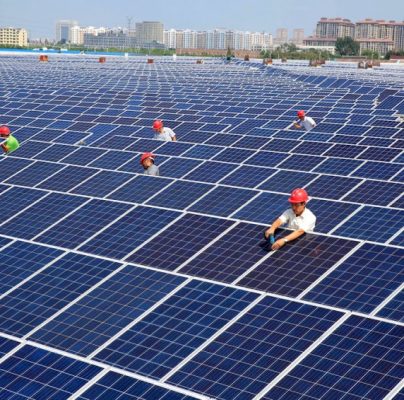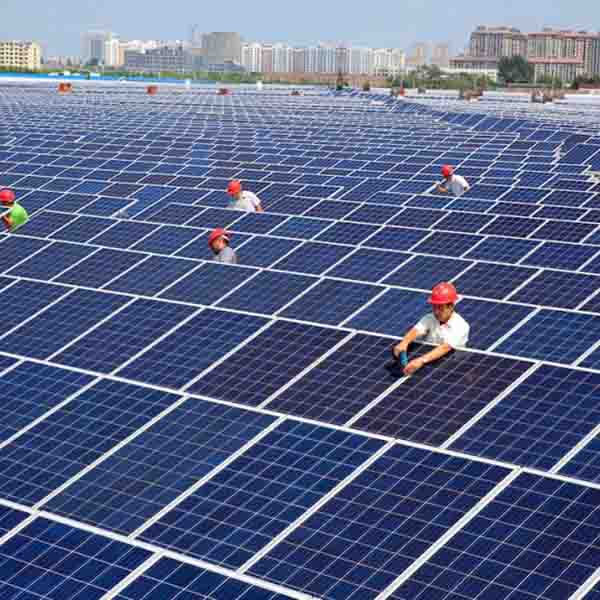
Solar energy is the technology used to harness the sun’s energy and make it useable. This is a common technology which mainly depends on solar panels to convert sunlight into electricity.
Many are familiar with so-called photovoltaic cells, or solar panels, found on things like spacecraft, rooftops, and handheld calculators. The cells are made of semiconductor materials like those found in computer chips. When sunlight hits the cells, it knocks electrons loose from their atoms. As the electrons flow through the cell, they generate electricity.
On a much larger scale, solar-thermal power plants employ various techniques to concentrate the sun’s energy as a heat source. The heat is then used to boil water to drive a steam turbine that generates electricity in much the same fashion as coal and nuclear power plants, supplying electricity for thousands of people.
Solar power is a green, quiet and clean energy alternative, which generates electricity by utilizing the power from the sun, these PV systems convert this power into a usable energy source. Solar Power reduces your carbon footprint by preventing greenhouse gases from entering the atmosphere, allowing you and the world to be one step closer in saving the environment.
When the sun shines, it produces photons. When these photons hit solar power panels, silicon components and conductors inside the panels convert the photons into DC electricity. Next, an inverter converts the DC (Direct Current), into 220V AC (Alternating Current) electricity. This conversion process is what makes the power usable for your home.
PROS AND CONS OF SOLAR ENERGY
While solar energy might seem as the cost-effective and efficient inexhaustible alternative to fossil fuels, it is also bound to some downsides and upsides.
Nonetheless, its pros outweigh its cons, hence the continued courage to implement it over the world. Especially, the developing countries where most people have no access to conventional energy or their economies cannot afford each citizen.
PROS
- Sustainability. The sun has been here for billions of years and it is going to exist even for more years to come. On the other hand, fossil fuels are being depleted. As thus, solar energy is sustainable.
- Reduced emissions – solar energy is eco-friendly with reduced impact on the environment. Concentrating solar power can, however, have a bad impact on water conservation but the photovoltaic system does not deplete water resources.
- Good security – Every country has access to the sun. Thus, each country can have access to solar energy even though others have more access than others.
- No dependence on fossil fuels. In particular, solar energy negates the need to depend on coal for electric power production that will cause emissions to the atmosphere
- Return on investment. While the initial cost may be expensive, there is actually a good return on investment with solar energy. That outweighs paying utility bills on a monthly basis
- Government incentives on renewable energy installations
- Potential to sell solar energy. In fact, if you have powerful PV panels that can generate excess electricity, you can send it to the utility grid and get paid for that
- No maintenance – solar energy systems last for many years. The panels can last for over 25 years with no maintenance. The only minimal maintenance required is to keep cleaning the panels and refilling the electrolyte in the storage batteries.
- Flexibility – solar energy can be installed anywhere. Off-grid systems are good for outdoor enthusiasts.
- Safety – solar energy is safer than the conventional fossil fuel electricity which can be life-threatening
CONS
- Land demands – to generate more energy needs a build of large power plants. As thus, one needs a large area to erect these plans.
- Interruption – in bad climates the sun is inefficient in generating more power. Households and businesses, however, need to compensate for that with large solar energy storage batteries.
- Expensive – the capital investment of solar energy systems is a stumbling block for many poor families. However, the system pays itself in fewer years after installation.
- It runs on DC power so you need inverters to convert the DC to AC power because electronics running on DC are expensive
- Poor energy production on cloudy days and during winter months
- High costs of producing solar panels


Reviews
There are no reviews yet.